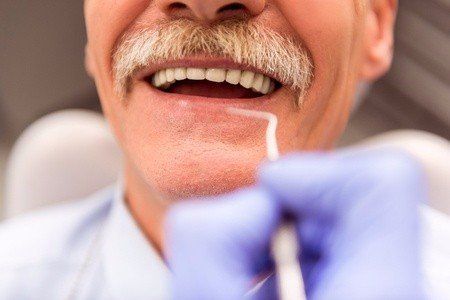When Do I Need Denture Adhesive?
Patients who wear partial or full dentures may see their appliances fit better through the use of denture adhesive. While adhesive isn’t always necessary, since well-fitting dentures don’t typically need assistance to stay in, many patients prefer to use it to provide some sense of security.
If patients feel they need this extra security, they should discuss it with their dentist first and ask questions – why are the dentures loose at all? Is adhesive necessary to be sure of the dentures’ fit? Are there other solutions available for improving comfort? A patient’s regular dental professional should be able to recommend the right solution for them regarding their dentures.
Average Lifespan
Since dentures are thought of as a type of cosmetic dentistry, a dentist or prosthodontist can make them. They can replace any number of missing teeth and only need to be taken out at night to be cleaned and removed while patients are sleeping.
Dentures can eventually become loose due to changes to bone and gum tissue, which starts receding once an original tooth is gone. This means that if dentures were fitted immediately after teeth were removed, patients may need to use adhesive for a short time, but if the dentures feel fine and are properly maintained, this might not be necessary.
Types of Denture Adhesive
Adhesive comes in several forms, such as powders, pads, and pastes, with the latter being the most commonly used product. As with any product, read the directions before using—if patients use too much paste, for example, the denture adhesive could change their bite and cause jaw problems, leading to premature wear and tear on the actual dentures. Powders, which are blended with water, have the simplest cleanup at night while removing the material, and pads, which are pre-cut shapes, must be trimmed to fit dentures comfortably.
Using Denture Adhesive
It’s best that adhesive is used in moderation and applied to only clean dentures, so patients should first remove and thoroughly wash their dentures before heading to bed, and then set them in water. In the morning, patients should then rinse their dentures, apply the suggested amount of denture adhesive, and place them in the mouth immediately.
With the dentures set, the adhesive should last throughout the day—upper dentures are less likely to become loose while eating, but lower dentures could loosen more easily. If this is the case, you might have to reapply adhesive at some point.
Dentures are the lower-cost choice for replacing teeth, but, being removable, if they loosen, they can trap food debris, allowing bacteria to accrue beneath them. Luckily, with these options for more fixed, supported teeth replacements, these drawbacks can be eliminated.
If you wear dentures, and you notice they don’t fit properly anymore, schedule an appointment with your dentist. They may only need to be replaced or relined, but some instances might require an adhesive to help patients feel more confident about their smile.
Need to make a trip to the dentist but afraid of the cost? Then you need our New Hampshire discount dental plan for seniors , individuals, business owners, and families! To find out how you can start saving as much as 20 percent off your bill, click here.
Copyright: georgerudy
/ 123RF Stock Photo











